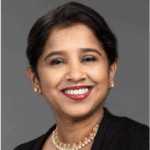From Inspiration to Impact: Mentoring Matters
By tradition, incoming ASA Board members participate in the November board meeting to learn from those who came before them. I had the opportunity to reflect upon how fortunate I have been to have the support of Kathy Ensor, Dionne Price, Ji-Hyun Lee, and past and present members of the board. My educational and career journey is also filled with inspiring mentors, which is why strengthening and expanding mentoring in our community is one of my initiatives.
Female Mentors in My Career
This month, I want to share a bit about my journey and specifically acknowledge women who have helped me along the way in honor of Women’s History Month, which just passed. My maternal grandmother, Hemlata, was an early role model for breaking stereotypes. She earned a BS in mathematics in 1940s Indian society.
My parents’ commitment to helping the disadvantaged suffused the environment in which I considered my future. My father recognized computer science as “the future” and encouraged me to apply to US colleges to pursue it. A scholarship brought me to Albright College, where Petee Jung—the only female professor in the mathematics department—bolstered my confidence to pursue a dual degree in mathematics and computer science.
Helen Walker, the first female president of the ASA, eloquently captured the association’s essence in her 1944 president’s address during the 104th Meeting of the American Statistical Association, titled “The Role of the American Statistical Association”:
While investigating graduate programs, I realized I wanted to work on multidisciplinary collaborations with the potential to affect lives. I studied statistics at Penn State, which housed many collaborative centers. The same desire has been a guiding force throughout my career and informs my goals for the ASA.
In my career since graduate school, I have been fortunate to follow exceptional female leaders. I was hired by Sally C. Morton, head of and the first female statistician in the RAND statistics group. Sally has had a career with incredible impact, evidenced by her many leadership roles in statistics, education, research, and national policy—including her service as ASA president and her promotion of women in statistics.
Another peer mentor who has influenced my journey is Susan Paddock, a colleague at RAND for more than 20 years. Now chief statistician at NORC and vice president of the ASA Board of Directors, Susan is recognized as a statistical thought leader with a deep commitment to cross-functional collaborations that bring out the best in both individuals and teams.
Strengthening the ASA Culture of Mentoring
Mentoring ties directly into the ASA Strategic Plan by developing the next generation of ASA leadership and building the value proposition of ASA membership. Each year, we recognize sustained commitment to mentoring through the ASA Mentoring Award. Many chapters, sections, and committees have established successful mentoring programs, as well. These efforts are especially important as we emerge from the pandemic and find new ways to build and maintain connections.
In January, I described my commitment to fostering ongoing mentoring programs and creating new opportunities. The goals of my mentoring initiative are to increase the diversity and breadth of our field. I have formed a working group that includes early-, mid-, and late-career individuals with varied backgrounds led by co-chairs Ruth Etzioni and Carolyn Rutter.
Ruth is the Rosalie and Harold Rae Brown Endowed Chair in Biostatistics at the Fred Hutchinson Cancer Center, where she focuses on generating evidence to inform medical decisions by individuals, providers, or policymakers. She was recognized with a National Cancer Institute Outstanding Investigator Award for her evaluation of clinical and population-level impact of novel cancer diagnostics. She also co-leads the Seattle StatGROWS (Generating Research Opportunities Within Statistics) summer undergraduate internship program to increase awareness of and interest in careers in statistics and data science.
Carolyn is a biostatistician at the Hutchinson Institute for Cancer Outcomes Research who evaluates the effectiveness and cost-effectiveness of cancer screening and identifying and addressing disparities in colorectal cancer incidence and survival. She has a demonstrated passion for early- to mid-career mentoring. Mid-career is an especially critical stage, at which many structured supports fall away and women leave careers in STEM.
As a first step, the working group is conducting an environmental scan to understand what successful programs are doing and identify potential gaps. This will involve getting the ASA community’s input through data collection and focus groups. This information will then be compiled into a ‘best practices’ document or briefing.
Through conversations I have had with ASA members, I know there is a need to add mid-career to the mix of early-career–focused programs. We also need to carefully consider both the scalability of mentoring models and evaluation of mentoring outcomes.
I have asked the working group members to be both visionary and practical in their recommendations—with specific action items provided for consideration. We will disseminate results of the scan throughout the ASA so implementation can begin with pilot studies and outcomes assessment.
Stay tuned, and please help the mentoring working group as they reach out for information. You can also use the feedback form on the ASA Community input page to convey your ideas.
Our careers and life journeys are unique but, for many of us, they retain the indelible footprints of our mentors. These mentors have not only enhanced our individual growth, but also shaped the societal perceptions and norms of our profession. The stories of the remarkable women I’ve written about here—indeed of all mentors—testify to the enduring power of mentorship in creating a brighter and more equitable future for all. Which mentors will you honor?



















Leave your response!